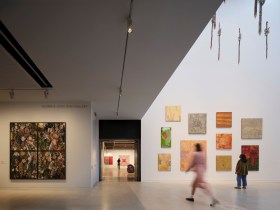Adelaide’s Tkay Maidza was among the Australian artists performing at the Sounds Australia showcase at SummerStage NYC, June 2019. Image: Sounds Australia via Facebook.
A new Australia Council report has found that Australia’s music industry makes an estimated $195 million from international markets each year.
Released 12 July 2019, the report Born Global: Australian music exports is the first to calculate the value of Australian music as an export. The paper is the result of three years of research by the University of Newcastle and Monash University, in partnership with Sounds Australia, APRA AMCOS and the Australia Council for the Arts.
‘We manage to do a lot with a little compared to some other countries,’ Australia Council arts practice director for music Paul Mason told ArtsHub.
Despite modest investments in music exports, and substantial geographic challenges, Australian artists are making serious strides abroad, Mason said, producing quality music across a range of genres and practices that is attracting international audiences.
‘It takes more resources [for Australians] to get to those international markets, but I’m excited by the fact that Australians aren’t intimidated by that distance. There’s a confidence and a curiosity that gets people on a plane and gets them going out to other markets and finding their audiences,’ Mason said.
Support from the Australia Council, state governments, and government-industry partnership programs like Sounds Australia has also helped more Australian musicians get their work out there, with major showcases at international market events like South by Southwest, jazzahead! and Classical:Next.
As more and more music makes its debut online, national borders are becoming less relevant than genres, styles, and other forms of community.
‘It’s certainly possible now for artists to start connecting with international audiences, collaborators and business partners very early on in their careers,’ Mason said. ‘All of the tools that are available through the internet have allowed people to find those pockets of like-minded people around the world and start building an international audience for themselves.
‘That’s at the core of this notion of being “born global”. The moment you put your music up on a streaming service, you are accessible to a global audience. But what the research finds is that that reach needs to be supported by a physical presence.’
‘The moment you put your music up on a streaming service, you are accessible to a global audience. But what the research finds is that that reach needs to be supported by a physical presence.’
Live performance remains the top source of international income for Australian musicians, but numbers are up across the board, with growth in the number of Australian artists earning foreign revenue, and overseas royalties to Australian artists doubling over the past five years according to APRA AMCOS.
The growth of streaming offers new opportunities, though it has inevitably also impacted other sources of income such as CD sales and downloads. ‘Sounds Australia now has a person developing playlists of Australian artists and that’s an example of how all aspects of support for Australian music have to move with these new developments. Streaming is too big to ignore,’ Mason said.
Born Global also looks at factors in international success, and how Australia’s support for music compares to countries such as Canada, Finland, France, South Korea, Sweden and the UK.
‘In the UK and South Korea, music has become a core component of the national branding strategy.’
In terms of key lessons from overseas, Mason cited greater understanding of music as a valuable export. ‘In the UK and South Korea, music has become a core component of the national branding strategy,’ he said. ‘Music export is integrated with other areas of government, with tourism, with industry, and so it’s embraced across the board as a part of the national identity of those countries in the world.’
‘More and more Australian musicians are now globally recognised household names, with music now standing alongside the powerhouses of Australian exports; food, agriculture, wine, tourism,’ said APRA AMCOS CEO Dean Ormston.
In terms of advice for musicians, Mason encourages artists to concentrate on the music: ‘The first tip is always focus on making the best music you can because that’s what connects with audiences. Beyond that, you can find your peers around the world and building those networks is really crucial.
‘Once you’ve established those networks, the pattern is to go to an international market event for the sorts of music that you make. The general advice is to just go and have a look before you showcase to wrap your head around how these markets operate. Once you’ve got a sense of what’s possible, that’s when you start seeking opportunities to showcase and have a performance presence. You can investigate opportunities through the Australia Council – residencies, grants – and also state government programs to support artists.’






